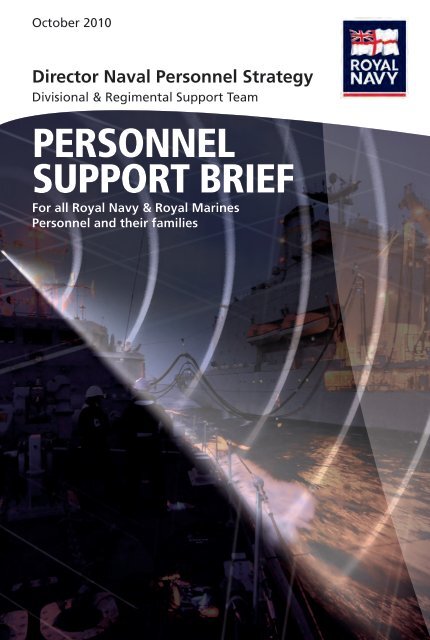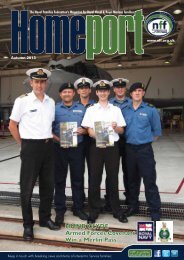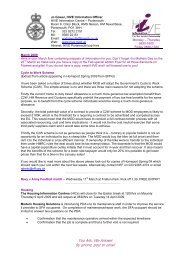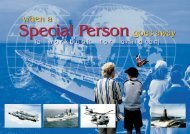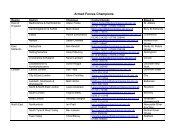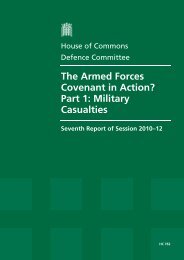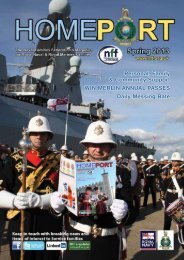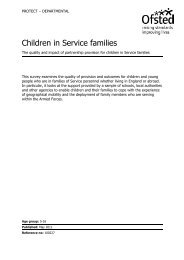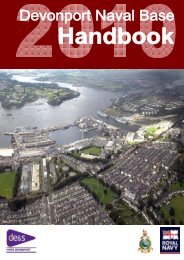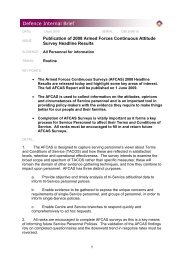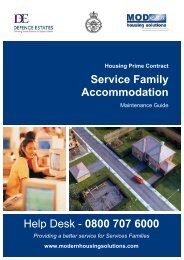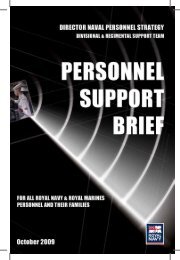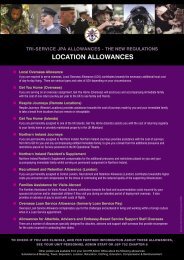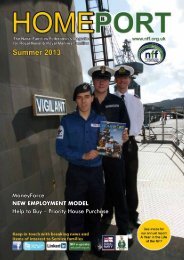PERSONNEL SUPPORT BRIEF - NFF
PERSONNEL SUPPORT BRIEF - NFF
PERSONNEL SUPPORT BRIEF - NFF
You also want an ePaper? Increase the reach of your titles
YUMPU automatically turns print PDFs into web optimized ePapers that Google loves.
October 2010<br />
Director Naval Personnel Strategy<br />
Divisional & Regimental Support Team<br />
<strong>PERSONNEL</strong><br />
<strong>SUPPORT</strong> <strong>BRIEF</strong><br />
For all Royal Navy & Royal Marines<br />
Personnel and their families
<strong>PERSONNEL</strong> <strong>SUPPORT</strong> <strong>BRIEF</strong> - AUTUMN 10<br />
CONTENTS<br />
Introduction by Vice Admiral C P R Montgomery CBE ADC – Second<br />
Sea Lord and Commander-in-Chief Naval Home Command<br />
Editor’s Notes<br />
Subject Briefs:<br />
1. JPA Update<br />
2. Personnel Functional Standards 2010 *<br />
3. Naval Service Recovery Pathway<br />
4. European Health Insurance Card<br />
5. Access to NHS Dentistry<br />
6. The Armed Forces Covenant *<br />
7. RN Adventurous Training<br />
8. National Cultural Awareness within the Naval Service<br />
9. Language Award Schemes - Update<br />
10. Financial Education<br />
11. Naval Families Federation (<strong>NFF</strong>)<br />
12. Equality, Diversity and Inclusion Update<br />
13. Service Life Insurance (SLI) *<br />
14. Royal Navy Fitness Test*<br />
15. Help For Those With Mortgages<br />
16. DNPS Intelligence Cell – Making Personnel’s Views Count<br />
17. BR3 – Naval Personnel Management*<br />
Lessons in Life<br />
Divisional Hot Topics<br />
Divisional and Regimental Reference List<br />
Divisional Regimental Support Team Contact Details<br />
* denotes briefing to personnel is mandatory<br />
1 PSB - Summer 10
INTRODUCTION<br />
BY VICE ADMIRAL C P R MONTGOMERY CBE ADC – SECOND SEA<br />
LORD AND COMMANDER-IN-CHIEF NAVAL HOME COMMAND<br />
It is a particular pleasure to<br />
introduce this Autumn’s edition of<br />
the Personnel Support Brief (PSB),<br />
the first during my time as Second<br />
Sea Lord. I rate the PSB highly. It<br />
is an excellent tool for helping<br />
Divisional and Regimental leaders<br />
in the essential job of making sure<br />
their teams are up-to-date on the<br />
policy developments that affect<br />
them as people.<br />
Having introduced a previous PSB as<br />
Naval Secretary in the Summer of 2007,<br />
I find that although times change<br />
and the Naval Service is continually<br />
improving, my message remains<br />
constant: that our people and their<br />
families are the Service’s crown jewels,<br />
the capability that lies at the heart of<br />
everything we do. Recognising this<br />
has never been more important than<br />
it is now, as we steer our way through<br />
some of the most testing economic<br />
and strategic tides of change in recent<br />
memory. We have good reason to be<br />
proud of our Divisional and Regimental<br />
system, the backbone of a network of care and communication that others rightly<br />
envy; but it cannot be taken for granted and nor should the people it supports. I am<br />
especially keen to see how we can improve the way we reach out to our families, who<br />
sustain us in everything that we do.<br />
Two-way communication is one of the things that give the Divisional and Regimental<br />
system its great strength. These briefs are aimed at keeping people in the picture,<br />
but the other half of the equation, equally important, is feeding back through the<br />
Divisional and Regimental Support Team in NCHQ. That way we can work together to<br />
build the evolution of our Service for the future on as firm a basis and as broad a front<br />
as possible.<br />
The PSB and associated 2-6 DVD contain a summary of recent initiatives, RNTMs and<br />
DINs and also include contact details of Naval Service subject matter experts for further<br />
information. I hope you will make the fullest use of them and that they will prove their<br />
worth as the pace of change continues.<br />
2
EDITOR’S NOTES<br />
<strong>PERSONNEL</strong> <strong>SUPPORT</strong> <strong>BRIEF</strong><br />
Welcome to the Autumn 2010 edition of the Personnel Support Brief (PSB) produced by<br />
the Divisional Regimental Support Team (DRST).<br />
The aim of this brief is deliver in a single source, the most up-to-date information on<br />
those personnel issues that are currently prominent from both a Navy Command HQ and<br />
individuals perspective. Please note that each edition of the PSB will contain different<br />
subjects although occasionally continuous updates on one subject (eg JPA) do occur. We<br />
welcome your comments on the publication though if you think we can do better, please<br />
let us know.<br />
The accompanying 2-6 DVD contains relevant material which is designed to support the<br />
Divisional and Regimental system in delivering key internal messages.<br />
As well as producing the PSB, the DRST aim to visit all units and establishments where RN<br />
and RM personnel serve on a two-yearly cycle – this is vital to ensure the Navy Command<br />
HQ receives feedback on personnel issues. If you have not received a visit from the team<br />
during the past 2 years then please get in contact to arrange a visit.<br />
A large number of hard copies of the PSB are distributed within the cover of the 2-6 DVD<br />
and it is also available electronically on: RNCom, and Naval Families Federation on the<br />
internet, and RNWeb (through A-Z index).<br />
Please ensure this publication is given the wide distribution within your unit –<br />
it must be seen by all Divisional Officers and Troop Commanders as it provides<br />
up to date information for Divisional/Troop meetings. If you have difficulty<br />
obtaining the PSB or insufficient copies and are unable to reproduce locally,<br />
then let us know.<br />
The publication deadlines for the next 3 editions of the PSB are listed below together<br />
with the Lead Editor to whom all contributions, comment and feedback should be passed<br />
directly:<br />
Submission of Briefs to<br />
the Editor<br />
Spring 11 Summer 11 Autumn 11<br />
9 Mar 11 8 Jun 11 9 Sep 11<br />
PSB to printers 18 Mar 11 20 Jun 11 19 Sep 11<br />
PSB issued Apr 11 Jul 11 Oct 11<br />
Lead Editor FXO FXO Air FXO<br />
Mike Dineen<br />
Fraser Hunt<br />
Lt Cdr RN<br />
Lt Cdr RN<br />
Fleet Executive Officer<br />
Fleet Executive Officer (Air)<br />
023 9262 8699 023 9262 8700<br />
93832 8699 93832 8700<br />
FLEET-DNPS PPOL DRST FXO SO2 FLEET-DNPS PPOL DRST FXO AIR SO2<br />
3 PSB - Summer 10
<strong>BRIEF</strong> 1<br />
JPA UPDATE<br />
Key Points:<br />
• New Buttons have been added on the JPA portal web page – DII(F) or non<br />
DII(F)<br />
• A significant proportion of incorrect JPA payments are due to errors in the<br />
Arrivals Process. Individuals need to see their unit HR as soon as possible<br />
after arrival to ensure their data is correct.<br />
• There is a requirement for the JPAC EC to ask you questions relating to your<br />
Memorable Data on JPA before they can discuss any issues with you. All<br />
personnel need to check that their memorable data is completed.<br />
• The facility to automatically reset passwords will be introduced by the end of<br />
the year.<br />
• There are some new buttons at the JPA portal page which now require you to select<br />
DII(F) or non-DII(F) when you log on. DII(F) will continue to be rolled out across all sites<br />
(it provides additional technical security features) so should be used if available. If you<br />
accidentally select DII(F) when you do not have a DII(F) log on, the system will reject<br />
you back to the log on page. Advice should be sought from the Unit IT Section as to<br />
whether you are at a DII(F) unit or not in the first instance, this is not a JPAC Enquiry<br />
Cell (JPAC EC) function.<br />
• Analysis of the reasons for incorrect payments occurring on JPA highlighted that a<br />
significant proportion happen because of errors in the Arrivals process and is usually<br />
because the individual has not completed the arrivals paperwork or attended the UPO.<br />
The Arrivals process relies on information supplied by the individual or already on the<br />
JPA account. It is very important therefore that individuals see their Unit HR as soon as<br />
possible after joining to check that all current information on JPA is correct and to give<br />
dates of actual arrival/departure from previous unit (this is not always the same as the<br />
latest assignment order on the system) as this information has a fundamental bearing<br />
on the allowances entitlement and the stop/start dates of those allowances.<br />
• If you need to contact the JPAC EC you will be asked questions relating to your<br />
memorable data in order to verify your identity before the agent can discuss your<br />
problem with you. For security purposes the default setting of using your National<br />
Insurance number has been removed because this information is potentially open to<br />
compromise. All personnel should check that they have set their memorable data on<br />
JPA (there are currently in excess of 7000 regulars in the RN/RM who are shown as not<br />
having done this). JPAC EC agents will advise personnel in setting memorable data if<br />
none is present before answering queries.<br />
• For those who have difficulty in remembering JPA Passwords, JPAC are introducing<br />
a system of automatic password resets broadly similar to most internet sites. If you<br />
forget your password you will be able to select a reset password button, you will be<br />
asked for 3 characters from your memorable data. Once complete you will be able to<br />
4
eset your password and then gain access to JPA. It is intended to introduce this by the<br />
end of this year, but again you will not be able to use this facility unless you have set<br />
up your memorable data.<br />
ENDURING MESSAGES<br />
• You should always access JPA via the Portal Page. This portal page contains a wealth<br />
of pertinent information for all users, not just HR professionals (next time you log<br />
on, try looking at the information available to you behind the Library button for<br />
example).<br />
• The importance of the accuracy of Personal Information held on JPA cannot be<br />
overstated. Personnel are required to check their details at least annually (iaw RNTM<br />
136/10), but should also ensure that they amend details as soon as they are aware of a<br />
change.<br />
Brief prepared by WO S Campbell;<br />
FLEET DNPS PPLAN BIS POL WO1 / 93832 8766<br />
5 PSB - Summer 10
<strong>BRIEF</strong> 2<br />
<strong>PERSONNEL</strong> FUNCTIONAL STANDARDS 2010 (PFS (2010))<br />
Key Points:<br />
• PFS have undergone a major review to incorporate recent changes in<br />
legislation, policy and the Service Personnel Command Paper.<br />
• PFS are not a contract, but they do define some of the essential Terms and<br />
Conditions of Service (TACOS) and set the standards which the Naval Service<br />
is committed to deliver for all of its people wherever possible.<br />
• They include procedures for identifying and reporting deficiencies<br />
(“Breaches”) through the Chain of Command to 2SL for subsequent<br />
management action or policy change.<br />
• Personnel Functional Standards (PFS) have undergone a major review for publication<br />
this year, reflecting changes in legislation, Tri-Service & Naval Service (NS) policies and<br />
the Service Personnel Command Paper. PFS now inputs directly into the assessment of<br />
the Moral Component of Operational Capability (MCofOC) for the NS. PFS apply to all<br />
regular NS personnel and to Reserve Forces according to the level of Service commitment<br />
that a reservist is undertaking.<br />
• PFS 2010 support 2SL’s intent for the NS and are a mechanism that contributes to the<br />
delivery of sufficient, capable and motivated personnel. This in turn, underpins the<br />
Navy’s Strategic Plan and the MOD’s Service Personnel Plan.<br />
• The Navy Board has endorsed PFS 2010, with 2SL as sponsor and responsible for<br />
monitoring the achievement and maintenance of the standards set. PFS have been<br />
developed, not as a contract, but as specific Terms and Conditions of Service that the<br />
Naval Service is committed to deliver for its people within available resources. In such<br />
challenging economic and demanding operational times, PFS will not always be met,<br />
however it is imperative that everyone - all units, budget holders and the Chain of<br />
Command – strive to achieve the standards laid out within PFS for the people who are at<br />
the heart of our military capability.<br />
• The key changes for PFS 2010 are outlined below:<br />
• A change of assignment notice for non-squadded Junior Ratings from 5 to 3<br />
months for shore to sea assignments, reflecting the reality of managing personnel<br />
within the context of current and anticipated future operational tempo.<br />
• Recognition of the Service Complaints Commissioner and revised service complaints<br />
procedures.<br />
• Updated to reflect the Armed Forces Act 06.<br />
• Increased opportunity for personnel in Phase 1 and 2 and trained strength<br />
personnel to participate in physical activity during the core working day; and that<br />
at least 20% of unit personnel are to be provided the opportunity to participate in<br />
Adventurous Training or Challenging Activities each year.<br />
• A new chapter detailing the major aspects of Health Promotion.<br />
• In order to assess how the Naval Service is meeting the PFS commitments, 2SL requires<br />
regular, accurate, evidence-based feedback, to be aligned with the quarterly MCofOC<br />
6
feedback already received. This is to establish a clear, objective understanding of issues<br />
affecting the achievement of PFS so that management action or policy change can be<br />
considered. All units have been sent the PFS Reporting Tool for the required quarterly<br />
PFS reports back to NCHQ, the first expected by 31st October 2010. PFS Reports are to be<br />
co-ordinated by the unit and approved through the unit command chain. Further details<br />
of the PFS reporting requirement can be found in the PFS 2010 publication.<br />
• PFS 2010 has been published on the RN Intranet and a limited number of hard copies<br />
have been distributed. PFS is also incorporated into BR3 Part 5 Ch 22.<br />
• Any queries relating to specific chapters should be directed to the Chapter sponsor<br />
identified in PFS 2010. General queries concerning PFS and the reporting requirement<br />
should be directed to the NCHQ leads for PFS 2010:<br />
DII(F) - Fleet-DNPS PPOL WLB SO1 Mil: 93832 5514 BT 02392 625514<br />
DII(F) - Fleet-DNPS PPOL CPO Mil: 93832 5516 BT 023 92 625516<br />
Brief prepared by Cdr Fiona Fawcett RN;<br />
Fleet-DNPS PPOL WLB SO1/ 93832 5514<br />
7 PSB - Summer 10
<strong>BRIEF</strong> 3<br />
NAVAL SERVICE RECOVERY PATHWAY<br />
Key points:<br />
• The Naval Service Recovery Pathway Policy was published in May 2010.<br />
• The “Recovery Pathway” is designed to support an individual’s return to<br />
effective service employment or to be supported through the transition<br />
process from service to civilian life, if it is deemed that they are unable to<br />
continue to serve in the Naval Service.<br />
• The Naval Service Recovery Pathway has two main elements supporting:<br />
seriously injured and wounded personnel; and personnel who require<br />
management for long term absence.<br />
• Bespoke Recovery Pathways are established, following co-ordinated case<br />
conferences, for individuals who become assigned to Hasler Company or the<br />
Naval Service Recovery Cells in HMNBs and NAS organisations.<br />
• The NS Recovery Pathway Policy has been published in 2010DIN01-097 and<br />
incorporated into BR3 Part 5 Ch 33. It provides guidance and direction on the<br />
following 2 key elements:<br />
• Recovery Pathway for seriously injured and wounded Naval Service personnel, who<br />
are managed in transition back to active service or to discharge, through Hasler<br />
Company.<br />
• Recovery Pathway for Naval Service personnel who require long term sickness,<br />
injury, pregnancy management, disciplinary, divisional or welfare care, who are<br />
managed through Recovery Cells or Royal Marine Base organisations.<br />
• The NS Recovery Pathway follows the following key principles:<br />
• All Naval Service personnel who have sustained service limiting injuries or require<br />
management for long term absence are to be managed through the Recovery<br />
Pathway process.<br />
• Assignment from parent unit to Hasler Company or the NS Recovery Cells is<br />
to follow a formal Case Conference co-ordinated by the parent unit Executive<br />
involving all relevant parties, such as medical, welfare, pastoral and Executive<br />
elements as required, to establish the best Recovery pathway for the individual.<br />
• Once assigned to Hasler Company or a Recovery Cell, the individual’s progress<br />
with their specific Recovery Pathway will be co-ordinated and maintained and<br />
individuals tracked by Hasler Company or Recovery Cell staffs.<br />
• A key enabler of the Recovery Pathway is to establish appropriate temporary<br />
employment opportunities for personnel as they work towards returning to service<br />
employability or have to make the transition to civilian life. The NS has worked<br />
closely with MoD to ensure that personnel on a Recovery Pathway programme<br />
have the opportunity to gradually adapt to the working environment by taking<br />
8
advantage of the Defence Career Partnership Recovery Placement (DCP RP) scheme<br />
as one option for temporary employability. (2009DIN01-184 – Defence Career<br />
Partnership Return to Work Initiative for Injured Service Personnel refers.)<br />
• POC for the NS Recovery Pathway Policy:<br />
Fleet-DNPS PPOL WLB SO1 - 93832 5514 (Overall policy lead for NS Recovery Pathway)<br />
Fleet-DNPS NPT(RM) REQM SO1/SO2 - 93832 8687 (SME for Policy for Seriously Injured)<br />
Brief prepared by Cdr Fiona Fawcett RN; Fleet-DNPS PPOL WLB SO1/<br />
93832 5514<br />
9 PSB - Summer 10
<strong>BRIEF</strong> 4<br />
EUROPEAN HEALTH INSURANCE CARD (EHIC)<br />
Key Points:<br />
• Navy Command HQ direction is for all NS personnel to hold a valid EHIC.<br />
• Application is free of charge.<br />
• The EHIC is valid for 5 years and you must have it with you when travelling<br />
abroad.<br />
• The EHIC is not an alternative to travel insurance.<br />
• Navy Command HQ has directed that all Naval Service personnel should apply for and<br />
hold a valid European Health Insurance Card (EHIC). This card replaces the E111 and will<br />
complement existing mechanisms for accessing healthcare overseas.<br />
• Applying for the card is free of charge at the link https://www.ehic.org.uk.<br />
• In order to apply on-line, ensure that you have your National Insurance Number (this is<br />
also on your payslip) to hand. Non-European Economic Area nationals are required to<br />
provide further documentation to support their application and will have to apply by<br />
post, application forms are available at the Post Office.<br />
• The EHIC is valid for up to five years and personnel should have their EHIC with them<br />
when travelling abroad; remembering to check it is valid before departing.<br />
• The requirement for Naval Service personnel to be in possession of a valid EHIC will be<br />
included in the pre-deployment medical directive.<br />
• Any further information regarding what the EHIC covers is available at the link. It should<br />
be noted that the EHIC is NOT an alternative to travel insurance and it will not cover any<br />
private medical healthcare or the cost of mountain rescue in ski resorts, repatriation to<br />
the UK or lost or stolen property.<br />
• Beware of websites demanding a fee for the EHIC. If you search on the internet for<br />
‘EHIC’ you will find sites that describe themselves as ‘reviewing’ or ‘forwarding’ services,<br />
charging around £10 to process your application. They may appear official but demand a<br />
cash payment at the end of the application process.<br />
Brief prepared by Cdr Julie Thain-Smith;<br />
FLEET-MEDDIV-PERS POL SO1 / 93832 5343<br />
10
<strong>BRIEF</strong> 5<br />
ACCESS TO NHS DENTISTRY<br />
Key Points:<br />
• Primary dental care is available by the NHS through NHS Direct.<br />
• Access is available either through www.nhsdirect.nhs.uk/ 0845 4647 (England<br />
and Wales) or www.NHS24.com/ 08454 242424 (Scotland).<br />
• Difficulties should be reported either through the Divisional chain or by<br />
contacting the Naval Families Federation (www.nff.org.uk).<br />
• There is a statutory responsibility for Primary Care Trusts in England, Health Boards in<br />
Scotland and Wales and Health and Social Care Trusts in Northern Ireland to secure<br />
dental services that meet local needs.<br />
• The Naval Service is aware that there remains a perception that primary dental care is<br />
not available by the NHS in the wider community. However, the “perception lag” in the<br />
population is improving as NHS Direct is becoming better known.<br />
• In England and Wales patients may access NHS Direct to find NHS dental care in their<br />
location.<br />
• The NHS Direct website is www.nhsdirect.nhs.uk and telephone number is 0845 4647.<br />
Where NHS dentistry is recognised as being in limited supply, there are dental access<br />
centres available.<br />
• In Scotland, patients may access NHS24. The website address is www.NHS24.com and the<br />
telephone number is 08454 242424.<br />
• Naval Service families who continue to meet with NHS dentistry access difficulties should<br />
report this through either the Divisional chain or by contacting the Naval Families<br />
Federation. This will enable accurate data recording and subsequent reporting to the<br />
Chief Dental Officer.<br />
• The Naval Families Federation website is http://www.nff.org.uk and further information<br />
regarding dentistry is found in the ‘Health’ section.<br />
Brief prepared by Cdr Julie Thain-Smith;<br />
FLEET-MEDDIV-PERS POL SO1 / 93832 5343<br />
11 PSB - Summer 10
<strong>BRIEF</strong> 6<br />
THE ARMED FORCES COVENANT<br />
Key Points:<br />
• The Armed Forces Covenant is the Government’s developing strategy for<br />
support to Armed Forces Personnel, their Families and Veterans.<br />
• A Covenant document is being prepared for the Prime Minister’s approval in<br />
the autumn.<br />
• The first completed commitment is a doubling of the Operational Allowance<br />
for Afghanistan and Iraq, effective from 6 May 10<br />
• The new Government declared on taking office that ‘we need to do much more to<br />
ensure that our Armed Forces have the support they need, and that veterans and<br />
their families are treated with the dignity that they deserve’. They made a number of<br />
commitments to ‘work to rebuild the Military Covenant’ 1 .<br />
• The Military Covenant is a fundamental Army concept that links the sacrifice of Service<br />
made by soldiers to the responsibility of the Army and the Nation to ‘treat them fairly,<br />
to value and respect them as individuals, and to sustain and reward them and their<br />
families with appropriate terms and conditions of service’ 2 .<br />
• The Prime Minister announced on HMS ARK ROYAL on 24 Jun that he wished the<br />
Military Covenant to be re-written to express this obligation of Government and<br />
Nation for the whole Armed Forces (hence the change in title). A draft document will<br />
be presented to the Prime Minister for approval in the autumn.<br />
• Many of the Coalition commitments will be led by other Government departments;<br />
MOD will work with them to develop and deliver them. More detail on delivery of<br />
these commitments will be provided as they develop.<br />
• Commitments related to the Military Covenant include: doubling the operational<br />
allowance, ensuring that injured personnel are treated in dedicated military wards,<br />
changing the rules so that Service personnel only have to register once on the Service<br />
register; exploring the potential for including Service children as part of the proposals<br />
for a pupil premium, providing university and further education scholarships for the<br />
children of Servicemen and women who have been killed on active duty since 1990,<br />
providing support for ex-Service personnel to study at university and creating a new<br />
programme, ‘Troops for Teachers’, to recruit ex-Service personnel into the teaching<br />
profession.<br />
• A Covenant Taskforce has been established by the Prime Minister to recommend<br />
innovative ways in which the Government can rebuild the Military Covenant. It includes<br />
representatives from MOD, Cabinet Office and academia and will report in the autumn.<br />
• This work builds on the good things that came out of the Service Personnel Command<br />
Paper and the Government intends to continue with the specific commitments and<br />
principles that were laid down within it.<br />
Brief prepared by Cdr Stuart Henderson; FLEET-DNPS PPOL CD SO1/93832 5522<br />
1<br />
HMSO, ‘The Coalition, Our Programme for Government’, p.15 http://programmeforgovernment.hmg.gov.uk/<br />
defence/index.html<br />
2<br />
Army Doctrine Publication 01 ‘Land Operations’ para 0715<br />
12
<strong>BRIEF</strong> 7<br />
RN ADVENTUROUS TRAINING<br />
Key Points:<br />
• 2SL’s PFS have been amended, upgrading AT from Cat B to Cat A.<br />
• Naval Outdoor Centre (Germany)’s (NOC(G)) Winter programme is now<br />
available.<br />
• Bid deadline for major expeditions taking place between Jun 11 and Jun 12 is<br />
01 Jan 11.<br />
• Recent amendment of 2SL’s PFS has seen AT increased in priority from a Cat B to Cat<br />
A PFS. This means that participation in AT is now a MANDATORY REQUIREMENT<br />
rather than a “desirable objective”. The target of 20% of Unit personnel being given<br />
the opportunity to participate in 5 days of AT remains, with an additional goal of<br />
30% take up of AT across the Naval Service.<br />
• In order to achieve this, COs can direct participation in Type 2 AT either at NOC(G) or<br />
through AT events being organised by Regional and Establishment ATIs. Participation<br />
need not be 5 consecutive days, and short expeditions and authorised Challenging<br />
Activities offer COs additional opportunities to meet their target. Units are also<br />
strongly encouraged to organise Type 3 AT (Expeditions) and full information is<br />
detailed in BRd 4024. A huge variety of Type 4 AT courses are also available through<br />
JSAT Centres and full details are available at www.ahrc.co.uk and www.jsastc.co.uk<br />
• NOC(G) continues to deliver outstanding AT to the NS at no cost to the individual.<br />
Their Winter Programme is now finalised and full details, including booking<br />
information, can be found at www.nocg.co.uk<br />
• Changes to the application process for Major Expeditions were rolled out in early<br />
2010 and the system is already proving a useful tool for forecasting AT activity. The<br />
next deadline for Major Expedition bids to reach HMS Temeraire is 01 Jan 2011,<br />
covering expeds planned for 01 Jun 11 - 01 Jun 12. A Major Expedition is generally<br />
defined as one that crosses international borders. Minor expeds in the UK (and localto-ship<br />
during foreign port visits) continue to be processed by Regional ATIs (North,<br />
West, East and RM). Full details on the Major Expedition application process is at:<br />
2010DIN01-031.<br />
Brief prepared by Maj Kenny Craig RM, SO2 AT/ 9380 22590<br />
13 PSB - Summer 10
<strong>BRIEF</strong> 8<br />
NATIONAL CULTURAL AWARENESS WITHIN THE NAVAL<br />
SERVICE<br />
Key Points:<br />
• The Naval Service recruits sailors, marines and officers from around the<br />
world and consequently has members from many different national cultures.<br />
• A guide to national cultural awareness within the Naval Service has been<br />
produced, which includes fact sheets for the national cultures which are<br />
most heavily represented. These provide Divisional Officers and Troop<br />
Commanders with basic information about each nation and guidance on<br />
dealing with members of the national culture.<br />
• The guide, which will be updated periodically, is available on the Navy<br />
Command Equality & Diversity Policy Team website at http://defenceintranet.<br />
diiweb.r.mil.uk/DefenceIntranet/Library/Navy/BrowseDocumentCategories/<br />
Personnel/EqualOpportunitiesAndDiversity/Diversity/CulturalAwareness.htm<br />
• The Naval Service recruits sailors, marines and officers from around the world. This<br />
means that we are living, working and fighting alongside people with different national<br />
cultural backgrounds, whose values, beliefs and behaviour may be different to ours. This<br />
diversity of our workforce brings us enormous operational benefits through being able<br />
to capitalise on different experiences, knowledge and talent. However, such differences<br />
can on occasion, and in the absence of understanding, be a cause of friction and a barrier<br />
to the smooth functioning of the Divisional and Regimental Systems.<br />
• A guide has been produced, aimed at Divisional Officers and Troop Commanders,<br />
who have a vital role in recognising and appreciating the cultural differences of the<br />
people who make up their Divisions and Troops. The guide summarises the nations<br />
who contribute the largest number of sailors and marines to the Naval Service today.<br />
The biggest single group, other than British nationals, are the 240 or so citizens from<br />
St Vincent, but there are also significant numbers of Fijians, Irish, South Africans,<br />
Trinidadians and Jamaicans currently serving. The guide provides basic reference material<br />
for each of the countries considered, along with some common cultural points for each.<br />
The guide is of course is no substitute for getting to know each member of your Division<br />
or Troop as an individual, but provides background material which assists in establishing<br />
a good relationship with and between members of a Division or Troop from a position of<br />
knowledge.<br />
Brief prepared by Cdr Dave Joyce;<br />
FLEET-DNPS PPOL 1 SO1/ 93832 5520<br />
14
<strong>BRIEF</strong> 9<br />
LANGUAGE AWARD SCHEMES - UPDATE<br />
Key Points:<br />
• The aim of Language Awards is to offer a financial incentive to encourage<br />
Service personnel to obtain and maintain military language competences<br />
that are related to the needs of the Services. There are currently 2 awards<br />
schemes; BLAS and DOLAS.<br />
• Financial awards are only given on passing a MoD Language Examination<br />
Board (MODLEB).<br />
• Competencies must be recorded on JPA so that personnel receive their<br />
financial award and be identified so they can use their skills for Service<br />
reasons if required. Contact the Defence Operational Languages Support Unit<br />
(DOLSU) to achieve this.<br />
• BLAS - The Defence Basic Language Awards Scheme. Eligible Service personnel are<br />
entitled to an initial award, incremental award and re-qualification award. Languages<br />
are arranged into 3 groups according to difficulty; more difficult languages attract a<br />
higher level of award.<br />
Group<br />
1 (most<br />
demanding)<br />
Languages Currently Assessed by DOLSU<br />
Amharic, Arabic*, Baluchi, Chinese (Cantonese), Chinese (Mandarin),<br />
Farsi / Dari*, Gurkhali, Hebrew, Hindi/Urdu, Kurdish, Japanese,<br />
Korean, Pashto*, Thai<br />
2 Albanian, Bulgarian, Czech, Finnish, Greek, Hungarian, Lithuanian,<br />
Polish, Romanian, Russian / Ukrainian, Serbian / Croatian / Bosnian,<br />
Slovak, Slovenian, Somali*, Swahili, Turkish, Malay / Indonesian<br />
3 Danish, Dutch, French, German, Icelandic, Italian, Norwegian,<br />
Portuguese (Brazilian / Metropolitan), Spanish (Castilian / Latin<br />
American), Swedish<br />
* These languages currently fall under the DOLAS scheme detailed below and hence attract a<br />
significantly higher award.<br />
• A MODLEB Examination leads to an assessment of the Service persons ability in each of<br />
the 4 language competence areas (Listening, Speaking, Reading and Writing) and awards<br />
Standardised Language Profile (SLP) points from 1 to 4 for each competence.<br />
• Service personnel who can listen and speak a language very well but read and write the<br />
language less well might score 3,3,1,1 – a total of 8 SLP points. In Russian, for example,<br />
this would give an initial award of £864 and a requalification award of £288 after 3 years.<br />
• Personnel who have skills in a language not listed above should still contact the DOLSU<br />
to confirm whether an assessment is possible, and register their competence on JPA<br />
as described below, as the list of languages which attract BLAS is subject to change.<br />
Service language training is only given for language-essential posts; BLAS is intended to<br />
encourage the declaration of untaught or academic language skills.<br />
15 PSB - Summer 10
• DOLAS - The Defence Operational Language Awards Scheme. The aim of the<br />
DOLAS is to provide a financial incentive to all ranks of the Armed Forces to declare,<br />
develop and maintain their ability in operationally important languages in order to<br />
support Defence missions. Operational languages currently include Arabic, Farsi, Dari,<br />
Pashto and Somali.<br />
• There are 4 skill levels of award; survival, functional, professional and expert. These are<br />
calculated by how many SLP points are held in various areas. An Arabic professional (9-12<br />
SLP points) would receive an initial award of up to £8,100. A daily payment between<br />
£16.20 and £48.60 (depending on experience) is also available when an individual<br />
is deployed to an appropriate operation. Service language training is only given for<br />
language-essential posts, but individuals may volunteer for training in an operational<br />
language to professional level for an operational linguist tour as an augmentee. Training<br />
and employment is a 2 year commitment.<br />
Additional Information<br />
• Recording Language Qualifications in JPA. 2008DIN07-060 stipulates how to record<br />
language qualifications obtained not through Service training. Essentially, complete<br />
Annex A of the DIN and send it to DOLSU for assessment and recording on JPA.<br />
• Further information can be obtained from the Defence Operational Languages Support<br />
Unit (DOLSU), Jt Cap, Trenchard Lines, UpAvon, Pewsey, Wiltshire, SN9 6BE, Telephone:<br />
01980 615358/615362, Mil: 94344 5358/5362, E-mail address: so1@dolsu.mod.uk.<br />
References:<br />
JSP 752 - Tri Service Regulations for Allowances. Chapter 9 Section 13 (BLAS and DOLAS).<br />
2008DIN07-060: Armed Forces Personnel – Recording of Foreign Language Skills<br />
Brief prepared by Cdr Dave Joyce;<br />
FLEET-DNPS PPOL 1 SO1, 93832 5520<br />
16
<strong>BRIEF</strong> 10<br />
FINANCIAL EDUCATION<br />
Key Points:<br />
• 2SL directive that it is a Command responsibility to initiate, support and<br />
embed financial education.<br />
• Divisional Officers should not provide financial advice, but they are to ensure<br />
that the educational methods available are briefed to their divisions.<br />
• A number of educational opportunities are available for personnel to learn<br />
about financial capability.<br />
• 2SL directive dated 14 Jul 08 made financial education a priority for our people. As well<br />
as being an important life skill, financial education now could save a huge amount<br />
of divisional work and personal anguish further downstream – all of which is directly<br />
related to the moral component of OC.<br />
• Naval personnel are not permitted to offer financial advice. Financial Awareness Training<br />
is a mandatory divisional briefing as all personnel should know both how to look after<br />
their own finances and where to signpost members of their division for guidance if<br />
required. These briefings are achieved in a number of ways:<br />
• The White Ensign Association (WEA) provides personal advice and support.<br />
WEA staff are specialists in personal finance and provide regular financial awareness<br />
presentations in most RN and RM establishments. The WEA can be contacted through<br />
www.whiteensign.co.uk.<br />
• The WEA brief captures a large number of personnel as they go through certain training<br />
establishments. This, albeit very valuable, cannot suffice for a person’s entire career<br />
or for those not initially briefed, therefore The Consumer Financial Educational<br />
Body (CFEB), previously part of the Financial Standards Authority (FSA), provides briefs<br />
on request. For a booking form contact FXO Air (details below). CFEB have a range of<br />
booklets called ‘Money Made Clear’ which provide facts about making the most of your<br />
money. These guides are available from www.moneymadeclear.org.uk.<br />
• Courses are available to help all Service personnel, and their families, in your local Royal<br />
Navy learndirect centre. Once you have enrolled, you can access your course through<br />
www.learndirect.co.uk wherever you have access to the internet.<br />
• Service personnel can visit Defence E-Learning Centres (DELCs) which offer a free<br />
course ‘Learn About Money’. This can be accessed on the internet through the Defence<br />
Learning Portal. Find your local DELC at www.delc.co.uk.<br />
Brief prepared by Lt Cdr Fraser Hunt;<br />
FLEET-DNPS PPOL DRST FXO AIR SO2/ 93832 8700<br />
17 PSB - Summer 10
<strong>BRIEF</strong> 11<br />
NAVAL FAMILIES FEDERATION (<strong>NFF</strong>)<br />
Key Points:<br />
• The Naval Families Federation offers an independent voice to Royal Naval<br />
and Royal Marines’ personnel and ALL members of their extended family.<br />
• The <strong>NFF</strong> can provide support and guidance on day to day issues that occur as<br />
a result of being part of a Naval Service family.<br />
• The <strong>NFF</strong> has direct access to the Chain of Command, the MOD and the<br />
Government. The organisation ensures that the challenges faced by Naval<br />
Service families are acknowledged, understood and considered in the ‘purple<br />
arena’ and when policies are reviewed.<br />
• The Naval Families Federation was established in 2003 to give Royal Naval and Royal<br />
Marines’ families an independent voice. We recognise that the impact of separation and<br />
mobility on Naval Service families can present challenges not commonly experienced by<br />
civilian populations. We are here to ensure that Service families are not disadvantaged;<br />
we can provide assistance on issues affecting day to day life and ensure that concerns are<br />
voiced in a constructive diplomatic manner.<br />
• There are numerous organisations offering assistance to Naval Service families and it<br />
can be confusing to know which one to approach. If you have an issue that you are<br />
struggling to resolve and other organisations have not found a way forward please<br />
contact the <strong>NFF</strong>. We really want to hear from you.<br />
• The <strong>NFF</strong> is not a call centre, but a small team who will take on your issue with vigour.<br />
As an independent organisation we can work both inside and outside of the system to<br />
source answers quickly.<br />
• The <strong>NFF</strong> is here to represent the needs and concerns of Naval Service families. We talk<br />
directly to the Chain of Command, service providers and the Government to make them<br />
aware of the consequences their policies and decisions make on the Naval Service family<br />
as a whole.<br />
• Your experiences form the basis of our discussions so please get in touch.<br />
• Contact us for a FREE copy of our quarterly magazine HOMEPORT, and for up to date<br />
news and information that affects you, check out our website. www.nff.org.uk<br />
Contact Details:<br />
<strong>NFF</strong>, Castaway House, 311 Twyford Avenue, Portsmouth, Hampshire, PO2 8RN.<br />
Tel: 023 9265 4374 Fax: 023 9265 3862 E-mail: admin@nff.org.uk<br />
Brief prepared by Emma Prince;<br />
Marketing & Communications Manager, <strong>NFF</strong>.<br />
18
<strong>BRIEF</strong> 12<br />
EQUALITY, DIVERSITY AND INCLUSION UPDATE<br />
Key Points:<br />
• The Navy Command E&D Policy Team Intranet Site (DII) has been revamped<br />
and updated<br />
• The Equality Act 2010 replaces the existing discrimination legislation with a<br />
single act<br />
• The Naval Service (NS) Mediation Policy for the Resolution of Workplace<br />
Based Disputes and Appropriate E&D Complaints has been issued in<br />
2010DIN01-119<br />
• The Navy Command Equality and Diversity Policy Team DII Intranet site http://<br />
defenceintranet.diiweb.r.mil.uk/DefenceIntranet/Teams/BrowseTeamCategories/<br />
Orgbased/Royal+Navy/NavyCommandEqualityAndDiversityPolicyTeam.htm has been<br />
revamped and now includes a range of information on Diversity, E&D Policies and<br />
Training, including civilian E&D Focal Points.<br />
• The Equality Act 2010 replaces existing discrimination legislation in order to provide<br />
a simpler, more consistent and more effective legal framework for preventing<br />
discrimination. The Act gained Royal Assent in Apr 10 and the core provisions will be<br />
implemented in stages from 1 Oct 10. Amongst other things, it includes a general duty to<br />
eliminate unlawful discrimination, harassment and victimisation and to advance equality<br />
of opportunity between different groups.<br />
• The NS Mediation Policy for the Resolution of Workplace Based Disputes and<br />
Appropriate E&D Complaints has been issued in 2010DIN01-119 and supersedes 2SL’s<br />
letter on Mediation dated 8 Apr 09.<br />
• Mediation is a well established process for resolving disagreements or disputes<br />
between two or more personnel, quickly, effectively, without the need to resort to<br />
more lengthy and formal methods, such as bullying and harassment (B&H) complaint<br />
investigations, redress procedures or Employment tribunals. It can be used to resolve<br />
appropriate informal and formal B&H complaints.<br />
• Mediation was introduced across the NS in early 2009. To date, over 89% of<br />
mediations have been successful demonstrating a proven and effective tool for<br />
dispute/complaint resolution and returning individuals to operational effectiveness as<br />
soon as possible. It is emphasised that the mediation process respects, and does not<br />
undermine, the military Command chain.<br />
Brief prepared by Lt Cdr Evison;<br />
FLEET DNPS PPOL EandD SO2A / 93832 5683<br />
19 PSB - Summer 10
<strong>BRIEF</strong> 13<br />
SERVICE LIFE INSURANCE (SLI)<br />
Key Points:<br />
• Clarify the intention and benefits of the SLI scheme post publication of<br />
2010DIN01-59.<br />
• Afford Naval Service Personnel (SP) the knowledge with which to make a<br />
decision on whether or not to take out SLI.<br />
• Furnish SP with information on how to join the SLI scheme.<br />
• Encourage SP to regularly review their life insurance needs, especially when<br />
circumstances change: for example, on getting married or having children.<br />
• During periods of combat operations, life insurance companies often react to what they<br />
perceive to be an increased risk to SP. In light of ‘The War on Terrorism’, Weapons of<br />
Mass Destruction (WMD) and the frequency of military deployments, as the likelihood of<br />
an insurer’s paying out increases; it will seek to transfer some of the risk it carries to the<br />
SP potentially by one of the following methods:<br />
• Increasing premium.<br />
• Excluding or reducing benefits for CBRN incidents.<br />
• Closing schemes to new applicants.<br />
• These methods of risk transfer, although legitimate, commercial measures, make<br />
it difficult for SP to obtain affordable life insurance. Even if military activity was to<br />
decrease and insurers stopped using such methods, they could re-introduce them at any<br />
time. Therefore, in order to provide SP with the option of guaranteed and affordable life<br />
insurance, Sterling Life, in close cooperation with the MOD, offer SLI.<br />
• It is for the individual to decide whether they require SLI, PAX, both or any other<br />
insurance scheme, considering whether AFPS and AFCS benefits will suffice to provide<br />
financial security for dependants. SP are encouraged to take independent financial<br />
advice if uncertain.<br />
• SLI is:<br />
• Continuously available throughout an individual’s military career and beyond (to the<br />
age of 65).<br />
• Available to all SP aged 18 – 45 by self-certification of good health, regardless of<br />
likelihood of operational deployment.<br />
• Available to SP over 45 subject to medical underwriting but able to insure against<br />
war and terrorism immediately.<br />
• Not subject to any additional premium for high risk trades or personnel on<br />
operations.<br />
• Policy terms available range from 3 to 25 years, with premiums being collected by either<br />
payroll deduction or direct debit.<br />
20
• Joining the Scheme. Should you wish to join complete the application form in the<br />
back of the SLI brochure: available from Unit HR or local HIVE. Or; apply online at www.<br />
servicelifeinsurance.co.uk.<br />
• Leaving the scheme. SLI members can cancel their cover but will not subsequently<br />
be permitted to start a new SLI policy within 3 years of the cancellation date. This is<br />
to prevent increased risk to SLI resulting from individuals joining immediately prior to<br />
operations and cancelling on return.<br />
• PAX differs from SLI in that it primarily offers personal accident cover (i.e. benefits<br />
for accidental bodily injury, including that resulting in death); individuals may have<br />
additional cover for death from natural causes through PAX but this comes at an extra<br />
premium.<br />
• A useful list of FAQs is included in the DIN. Queries of both potential and<br />
existing members of the scheme can be directed to the SLI Team. SLITeam@<br />
servicelifeinsurance.co.uk/ 020 8334 1557.<br />
Brief prepared by Cdr Steve Young;<br />
Fleet-DNPS PPA SO1/ 9621 83454<br />
21 PSB - Summer 10
<strong>BRIEF</strong> 14<br />
ROYAL NAVY FITNESS TEST<br />
Key Points:<br />
• Gradual Introduction of the RNFT for all personnel up to age 55<br />
• Introduction of the Declaration and Health Questionnaire (DHQ) for<br />
personnel aged 40 or over<br />
• Introduction of the Armed Forces Weight Management Policy for RNFT<br />
failures<br />
• Changes to medical referral criteria for RNFT failures<br />
• RNFT provision by Tri-Service Physical Trainers<br />
• From Jun 10 the RNFT will apply to all serving RN personnel under the age of 55. This<br />
will be implemented in staged increments, starting with those who are 50 on or after 1<br />
Jun 10. Therefore, personnel who reach the age 50 from 1 Jun 10 onwards will continue<br />
to be eligible for the RNFT until they reach age 55. Personnel over the age of 50 are<br />
strongly encouraged to undertake the Rockport Walk as this test minimises the risk of<br />
musculoskeletal injury and/or cardiac injury. Personnel over 50, who regularly undertake<br />
rigorous physical exercise and have no medical concerns, may request, as a personal<br />
decision, to undertake a maximal test (ie 2.4Km run or MSFT). However, they must be<br />
made fully aware that exercise at high intensities (maximal or close maximal) particularly<br />
in the older age groups increases the risk of a cardiovascular event. Personnel who are<br />
already in the 50-55 age groups will remain subject to the current policy and will continue<br />
to be exempt from compulsory RNFT. They are nevertheless encouraged to maintain a<br />
lifestyle that includes regular physical activity and to undertake the RNFT voluntarily.<br />
• The Defence Health Questionnaire (DHQ) is a basic medical screening aid to identify<br />
those who may be potentially at risk and to allow them to seek medical advice on<br />
eligibility without sharing confidential medical information with PT or other staff<br />
inappropriately – All personnel of 40 years of age or over will be required to complete<br />
and sign the DHQ before taking the RNFT.<br />
• The Armed Forces Weight Management Policy came into effect on 1 Oct 09 and has been<br />
introduced as part of the Defence Health Strategy. The policy centres on three main<br />
areas: weight measurement, management and prevention. This policy will be gradually<br />
implemented in the RN starting with RNFT failures from 1 Jan 10. After this date all<br />
personnel who fail the RNFT are to be measured and corresponding action taken in<br />
accordance with the Naval Service Weight Management protocols.<br />
• Automatic referral to the Medical Officer (MO) after the first RNFT failure is no longer<br />
necessary unless there is a particular medical concern or the Body Mass Composition<br />
index indicates that the individual requires medical intervention. Automatic referral<br />
must be undertaken if the individual continues to fail the RNFT after the first Remedial<br />
Training (RT) package (ie at the 3 month point). PT Staff/Medical Staff are to ensure that<br />
the medical assessment (height, weight, waist circumference, blood pressure, peak expiry<br />
22
flow rate, result of dipstick urinalysis) is conducted by PT staff/medical staff and relevant<br />
details inserted on the ‘RNFT Medical Assessment’ section of the RNFT form 5, prior to<br />
the individual attending their appointment with the MO.<br />
• Any qualified Tri-Service Physical Trainer (PT) may conduct the Maximal Tests (2.4km run<br />
or MSFT) but only those who have attended the RNFT Polar Heart Rate Monitor Course<br />
at RNSPT may conduct the Rockport Walk or issue RN Remedial Training instructions.<br />
Units without permanent RN PT personnel will be assigned a PT from their base port or<br />
regional staff who will provide the appropriate assistance.<br />
Brief prepared by Lt Doug Wylie RN;<br />
Temeraire-SO2PED / 9380 27701<br />
23 PSB - Summer 10
<strong>BRIEF</strong> 15<br />
HELP FOR THOSE WITH MORTGAGES<br />
Key Points:<br />
• Three-quarters of mortgage holders don’t know how an interest rate change<br />
of one percentage point could affect their monthly outgoings.<br />
• The Consumer Financial Education Body (CFEB) has launched the ‘Stay on top<br />
of your mortgage’ campaign.<br />
• Divisional Meetings should be used to raise awareness of the free and<br />
impartial resources available from CFEB.<br />
• Personal guidance and advice on these issues is also available from The<br />
White Ensign Association.<br />
• Stay on top of your mortgage - Three-quarters of mortgage holders don’t know how an<br />
interest rate change of one percentage point could affect their monthly outgoings - even<br />
though over half of mortgage holders believe interest rates will change in the next nine<br />
months. (CFEB research, 2010)<br />
• The Consumer Financial Education Body (CFEB) launched the ‘Stay on top of your<br />
mortgage’ this summer to provide home-owners with essential help and to prepare for<br />
when interest rates – or personal circumstances – change. It helps people to take control<br />
so that they don’t fall behind with their mortgage repayments later. CFEB’s ‘mortgage<br />
toolkit’ is free to use at: www.moneymadeclear.org.uk/mortgages<br />
• If a homeowner has a £150,000 interest-only mortgage and their lender increases the<br />
interest rate by just one percentage point, the homeowner’s monthly payments would<br />
go up by £125 per calendar month.<br />
• The Moneymadeclear ‘mortgage toolkit’ includes a “cut-back calculator” to show how<br />
cutting back on small purchases can quickly add up to substantial savings. The budget<br />
planner helps people see where their money is going each month, making it easier<br />
to spot where they could make changes. If a mortgage deal is coming to an end, the<br />
impartial mortgage comparison tables will help when it is time to shop around.<br />
• CFEB is an independent body responsible for helping consumers understand financial<br />
matters and manage their finances better. CFEB was established by the Financial Services<br />
Authority (FSA) and deliver impartial financial information, education and advice to<br />
consumers through “Moneymadeclear”.<br />
• The Moneymadeclear service is also available over the phone on 0300 500 5000 and<br />
through a range of free, printed Moneymadeclear guides including ‘Just the facts<br />
about mortgages’ and ‘You can afford your mortgage now, but what if?’ at www.<br />
moneymadeclear.org.uk<br />
• The White Ensign Association, with its panel of finance and mortgage advisors, works<br />
closely with the CFEB and is the CFEB’s preferred provider of financial capability<br />
presentations to naval audiences. The WEA readily endorses the guidance made available<br />
by the CFEB.<br />
• For more information on CFEB and their work visit www.cfebuk.org.uk<br />
Brief prepared by Mr Joseph Walsh;<br />
joewalsh@moneymadeclear.org.uk<br />
24
<strong>BRIEF</strong> 16<br />
DNPS INTELLIGENCE CELL – Making personnel’s views count<br />
Key Points:<br />
• The latest quarterly personnel feedback has highlighted the following;<br />
• Pride, ethos and team working remain top positives aspects of Service<br />
life. Welfare support, dental care, and 1ROs have become more positive.<br />
• Continued concern regarding short term overstretch (esp. alongside,<br />
including ability to take leave) at cost of long term morale/retention<br />
• Impact on family life and feeling valued for both serving personnel and<br />
families remain negative aspects of Service life.<br />
• Overall attitudes towards Service life have improved.<br />
• These issues have been reported to the Navy Board and relevant desk officers<br />
to shape personnel initiatives. This has included evidence for the annual pay<br />
review, evaluating the success of the Geographical Squad Pooling trial and<br />
supporting other branch and arm specific initiatives to better support our<br />
people.<br />
• As we understand and take forward the outcomes of the Strategic Defence<br />
Review the CAS evidence will be critical to shaping this. Personnel sent the<br />
survey should ensure they use their opportunity to have their say.<br />
• The role of the DNPS Intelligence Cell is to combine the feedback received from the HR<br />
Research team and DRST team to more effectively influence personnel strategy and<br />
policy formation.<br />
• The feedback is summarised and reported at all levels including; Ministers, Defence<br />
Board, 2SL, Navy Board, AFPRB, and policy desk officers across the Naval Service<br />
personnel area.<br />
• The latest quarterly update has highlighted the following issues;<br />
• Armed Forces CAS (2010) - AFCAS 2010 Spring version closed in July. Initial indications<br />
are that response rates were up across the board with the RN 42% (38% in 2009), RM<br />
37% (22% in 2009) and overall Naval Service 41% (31% in 2009). A big thank you to<br />
all that took part and to those points of contact at units that have contributed to this<br />
improvement in the response rate.<br />
• The autumn version is out beginning of September and gives those selected the<br />
opportunity to have their say. It is important that personnel take part and have their<br />
views heard! The 2010 report is expected to be published April 2011.<br />
• Families CAS (2010) - The top positive areas of feedback were; accommodation<br />
(location and cost), support services, amount of leave and pension (68% or more<br />
positive).<br />
• The top negative areas of feedback were; impact on family life and spouse careers (over<br />
60% negative).<br />
• For the first time the Naval Service Families CAS data has been merged with data from<br />
the other Services and will be used as a measure of effectiveness of commitments within<br />
the Service Personnel Command Paper (to be superseded by the Military Covenant).<br />
25 PSB - Summer 10
• DRST visits (2nd QTR 2010) - The negative themes were; non-financial terms and<br />
conditions, allowance packages, augmentation, accommodation and personal job<br />
satisfaction.<br />
• The feedback received is currently being fed back to 2SL and the relevant personnel<br />
policy desk officers. An update on the resulting actions will be reported in future<br />
publications of the PSB and through the normal IC channels (e.g. Navy News/Globe and<br />
Laurel).<br />
• Access to the full reports on any of the surveys conducted can be provided by the DNPS<br />
HR Research Manager or via the DNPS HR Research Webpage.<br />
• The findings have been reported to the Navy Board and are being used to develop a<br />
campaign plan to better support and value our personnel.<br />
Brief prepared by Rachel Collins;<br />
Fleet-DNPS FP RSCH(PSYCH) SO1C / 93832 5495<br />
26
<strong>BRIEF</strong> 17<br />
BR3 – NAVAL <strong>PERSONNEL</strong> MANAGEMENT<br />
Key Points:<br />
• BR3’s enlarged August 2010 edition has superseded many other well-known<br />
BRs.<br />
• This makes BR3 the single key BR for all Personnel matters covered by Naval<br />
Secretary/COS(Personnel)’s area. A 2010DIN in the 01 series is being issued as<br />
this PSB goes to press. Navy News published an article in their June issue, with<br />
an update in October. Globe & Laurel will publish an article in the November/<br />
December issue. There are plans for a feature in the autumn 2-6 DVD.<br />
• The aim is that BR3 will be further expanded in the next few months to cover<br />
some FOST business and Naval Reserves.<br />
• BR3 is now 2SL’s “one-stop shop” for most areas of Naval Personnel Management.<br />
• The hugely expanded coverage of BR3’s August 2010 Edition includes: 2SL’s Organisation<br />
and Strategy; Personnel Planning and Costing; Establishment Lists Administration;<br />
Recruiting; Legal and Discipline policy; the Divisional System; PFS; Representations and<br />
Service Complaints; Accommodation; Leave; Finance; Medical and Dental care; Physical<br />
Development; Equality & Diversity; Religion & Belief; Service Funds and Charities; the<br />
Recovery Pathway; Uniform Regulations; Careers; Transfers; Return of Service; Leaving<br />
the Service; Appraisal and Warnings; Career Management; the Assignment process;<br />
Requirements Management; and Promotions.<br />
• It is a fully-interactive publication with embedded links to make moving around it as easy<br />
as possible (with the Navigation toolbar enabled). It is available on the Defence Intranet<br />
(via the Navy Library); on the Internet (www.royalnavy.mod.uk/referencelibrary);<br />
and it is sent on CD to units covered by the Fleet Bridge Card. It is not issued in hard copy<br />
and, as it is very large (with 81 Chapters, and many Annexes and Appendices), it is not<br />
to be printed in full. Any extracts printed locally will necessarily only be valid on the day<br />
they are printed. It is intended that BR3 will be updated 2 or 3 times per year.<br />
• The August 2010 edition of BR3 superseded the following publications, many of which<br />
will be very familiar to readers – all copies of all these must now be destroyed or<br />
archived, as they are increasingly out-of-date:<br />
BR14 (Drafting Instructions)<br />
BR81 (Uniform Regulations)<br />
BR1066 (Promotion and Advancement Regulations)<br />
BR1992 (Divisional Handbook)<br />
BR4017 (Naval Manning Manual)<br />
BR8373 (Officers’ Career Regulations)<br />
BR8588 (Welfare of Naval Personnel)<br />
BR8748 (Terms of Service for RN, QARNNS and WRNS ratings and RM ranks)<br />
• Watch out for the next edition that will add other important material on Individual<br />
Training, Education, Lifelong Learning, Resettlement and Reserves.<br />
Brief prepared by Cdr Peter Hughes;<br />
Fleet-DNPS PPOL 5 SO1 / 93832 5521<br />
27 PSB - Summer 10
LESSONS IN LIFE<br />
RNFT Failure<br />
An AB1 was Discharged SHORE recently on the grounds of his Unsuitability – Persistent<br />
RNFT Failure.<br />
Having been subject to the required warning procedure for an appropriate time period<br />
and been afforded adequate time to rectify the situation, the AB1 ultimately lacked the<br />
commitment and effort needed to achieve the standard required to pass the RNFT. There<br />
is no medical reason why the AB1 cannot pass his RNFT and thus the Discharge SHORE was<br />
approved.<br />
Remember:<br />
You must be in date for your RNFT on your Common Reporting Date if you want to be<br />
considered to promotion or commission transfer.<br />
Only those recorded as in date on JPA will be considered by the Promotion Board - this is an<br />
individual responsibility - if in doubt check 2010DIN01-024<br />
Reports for Promotion/Selection<br />
During a recent SJAR and Competency check in preparation for a selection board it was<br />
discovered that, despite being put forward by their Chain of Command, a number of the<br />
potential candidates were ineligible for selection.<br />
One reason for ineligibility was that the potential candidate did not have an in date RNFT<br />
pass or a clear reason for exemption recorded on JPA. If you have had a change in medical<br />
category that exempts you from the RNFT it remains your responsibility to ensure that your<br />
JPA record is updated.<br />
Another reason for ineligibility was the use of ‘Developing’ as opposed to ‘Yes’ (or<br />
higher) for promotion 1 Rank up in an Appraisal Report. On subsequent investigation it<br />
became apparent that there was confusion as to the criteria for these recommendations.<br />
Reporting Officers had used ‘Developing’ as they had mistakenly believed that they were<br />
required to consider ‘eligibility’ for promotion (e.g. yet to obtain sufficient sea time).<br />
The recommendations matrix in JSP 757 Art 4.36 provides for assessments to be made on<br />
‘suitability’ for promotion without regard for ‘eligibility’.<br />
In making their assessments, Reporting Officers should disregard whether the individual<br />
is eligible for promotion in accordance with BR1066 and purely focus on the Subjects’<br />
suitability e.g Command, Leadership and Management skills, knowledge, ability to<br />
complete any promotion training (Command or Professional) – to hold the next higher<br />
rank or rate within the next 12 months. Individuals who demonstrate all the personal/<br />
professional attributes necessary for promotion but, as yet, are not fully qualified may still<br />
be awarded ‘Yes’ or higher for promotion 1 Rank Up.<br />
Conversely, individuals qualified in all respects for promotion but who do not exhibit the<br />
personal qualities required for higher rank/rate should be awarded ‘Dev’ or ‘No’.<br />
Only those awarded ‘Yes’ or higher for promotion 1 Rank Up, and who meet any other prerequisites<br />
will be considered by promotion or those sideways transfer selection boards that<br />
also act as promotion boards.<br />
JSP 757 provides detailed guidance for Reporting Officers.<br />
28
ROYAL NAVAL LEADERSHIP ACADEMY UPDATES AND<br />
DIVISIONAL HOT TOPICS<br />
Key Points:<br />
• Leadership Course (SRLC / LRLC) – amendments to pre-course documentation<br />
and Fitness Test on day one<br />
• Consequences following removal from Leadership Course<br />
• Divisional Officers Course Joining Instructions<br />
• Qualified Educationally for Petty Officer<br />
• Leadership Course (SRLC / LRLC) With effect from 30 Aug 10 personnel attending<br />
leadership course will be required to conduct a 2.4km Run RNFT (or Rockport walk<br />
where appropriate) on the first day of leadership course. Failure will result in instant<br />
removal from course and be recorded on JPA as an RNFT fail, thus instigating the<br />
remedial training requirement. This does not negate the requirement for individuals<br />
to be in date prior to arrival however pre-course documentation has been amended.<br />
Full details and new documentation/joining instructions can be found in RNTM<br />
194/10. Divisional Officers should also be aware of the information contained within<br />
the RNLA website http://cwd-r-web-001.cwd.dii.r.mil.uk/RNLA/leadership.html<br />
• Consequences following removal from Leadership Course. The consequences<br />
following removal from leadership course are considered depending on the following<br />
factors:<br />
• Reason for removal<br />
• Number of previous attempts<br />
• Promotion/selection status<br />
Consequences may include de-selection, reversion or a second attempt to successfully<br />
complete the course, which may or may not delay an individual’s promotion date,<br />
depending on circumstances. In all cases Divisional Officers should consult the relevant<br />
publication (currently BR3 6722/6908). Any queries should be directed to 2IC RASqn<br />
(RNLA) or the Promotions Office.<br />
• Divisional Officers Course (DOC) Joining Instructions. Joining instructions for<br />
those nominated to attend Divisional Officer Course can be found on the Divisional<br />
page of the RNLA website: http://cwd-r-web-001.cwd.dii.r.mil.uk/RNLA/doc.html<br />
• Qualified Educationally for PO. Personnel should be reminded that from 1 Apr<br />
12, NAMET scores will not be considered as educational qualifications for promotion<br />
to PO/Sgt. From this date personnel will have to achieve Level 2 Certificates in Adult<br />
Literacy and Numeracy (LANTERN) or hold a proxy qualification prior to promotion<br />
to PO/Sgt. Branches which currently do not require NAMET 3:3 for promotion to PO<br />
will require level 2 or proxy qualification from 1 Apr 12. Personnel who have NAMET<br />
3:3 will not be recognised as Qualified Educationally for PO (QEPO) from 1 Apr 2012.<br />
Please ensure those who are not currently qualified are aware and able to use the<br />
advance warning wisely. Consult 2010DIN07-024 for further details.<br />
Brief prepared by Lt Sarah Clewes;<br />
LTO (Divisional & Management) Royal Arthur Squadron (RNLA)<br />
Tel: 93825 3184<br />
29 PSB - Summer 10
DIVISIONAL REGIMENTAL REFERENCE LIST<br />
References in italics have been presented in previous Personnel Support Briefs.<br />
However, they remain relevant.<br />
Advancement & Promotion<br />
2010DIN07-024<br />
Naval Service Educational Requirements for Promotion to<br />
Leading Hand/Corporal and Petty Officer/Sergeant<br />
Appraisal<br />
RNTM 110/10<br />
RNTM 152/10<br />
2010DIN01-126<br />
Branch Matters<br />
RNTM 072/10<br />
SJARs – Recommendations for promotion 1 Rank Up<br />
Appraisal Report on Supersession of 1RO<br />
Seaman Specialist – AB & LSEA preparation for Promotion<br />
taskbook.<br />
RNTM 073/10 Seaman Specialist Written Provisional Examination –<br />
Application Process<br />
RNTM 083/10<br />
RNTM 087/10<br />
RNTM 079/10<br />
RNTM 111/10<br />
Clarification for the conduct and timing of Engineering<br />
Branch Operational Performance Statement assessments of<br />
Engineering Technicians<br />
Conduct and standard of Operational Performance Statement<br />
assessments of WEGS and WESM Engineering Technicians.<br />
Recruiting For The RN Family Services Branch And Royal<br />
Marines Welfare<br />
Warfare Branch - (General Service) – Written Provisional<br />
Examinations Seaman Specialist & Diver/HM/MW Groups<br />
Dates For 2010<br />
RNTM 144/10 Cessation of the Submarine Rating Recruitment Bounty -<br />
‘Recruit an OPPO’<br />
RNTM 147/10<br />
GALAXY 10-10<br />
RNTM 184/10<br />
Galaxy 16-2010<br />
RNTM 195/10<br />
Career Management<br />
2010DIN01-097<br />
RNTM 140/10<br />
JPA Competencies for the Royal Navy Police (RNP)<br />
Changes to Logistics Branch Specialist Titles<br />
Seaman Specialists Written Provisional Examination<br />
Employment of females in the Clearance Diver Specialisation<br />
Update of Competence requirements for Marine<br />
Engineering Department Senior Rates<br />
Naval Service Recovery Pathway Policy<br />
Introduction of new Naval Service manning & training<br />
margin categories and JPA positions<br />
30
Charities – RM / RN Charities website: www.rnrmc.org.uk<br />
2009DIN01-228<br />
RNTM 206/09<br />
RNTM 220/09<br />
RNTM 099/10<br />
The Naval Service Prizes and Awards Fund (The Charity) No<br />
111779416 (contact charities for further info/application)<br />
The Naval Service Assisted Passage Scheme<br />
The Sports Amenities And Benevolence Scheme (SABS)<br />
Compensation<br />
GALAXY 19-2010 Changes to the Armed Forces Compensation Scheme<br />
Complaints & Representations – Service Complaints Commissioner website: http://<br />
armedforcescomplaints.independent.gov.uk/<br />
DIB 14/10<br />
Fairness, Effectiveness and Efficiency of the Service<br />
Complaints Process<br />
RNTM 155/10<br />
2010DIN01-109<br />
2010DIN01-119<br />
2010DIN01-153<br />
Equality & Diversity<br />
2009DIN 01-007<br />
Revised procedure for the management of service<br />
complaints at Level 1 in the Navy Command<br />
Publication of Revised JSP 763 MOD Bullying & Harassment<br />
Procedures and JSP 831 Service Complaints<br />
The Naval Service Mediation Policy for the Resolution of<br />
Workplace Based Disputes and Appropriate E&D Complaints<br />
Statement of Principles of Fairness for the handling of<br />
Service Complaints<br />
Policy for the Recruitment and Management of Transsexual<br />
Personnel in the Armed Forces<br />
2009DIN07-148 Joint Equality and Diversity Training Centre (JEDTC) –<br />
Equality and Diversity Training 2010 – 2011<br />
2010DIN07-085<br />
Family<br />
RNTM 200/10<br />
Galaxy 18-2010<br />
Equality and Diversity Training: Implementation of Core and<br />
Advanced Level Training for Naval Service Personnel<br />
Updated Home Office advice on British citizenship rules for<br />
children of foreign and commonwealth citizens born while<br />
on overseas postings<br />
Access to NHS Dentistry<br />
Health and Medical Administration (inc Healthy Lifestyle)<br />
2010DIN01-074<br />
Instructions for Service and entitled personnel serving overseas<br />
who receive dental treatment from non-Service sources<br />
2010DIN01-110<br />
RNTM 142/10<br />
Requirement for Naval Service Personnel to hold a valid<br />
European Health Insurance Card (EHIC)<br />
Public funding for Naval Service personnel in remote<br />
locations to access fitness training facilities<br />
31 PSB - Summer 10
2010DIN01-143<br />
Honours & Awards<br />
2009DIN01-228<br />
RNTM 206/09<br />
Home Ownership<br />
DIB 02/10<br />
Insurance<br />
2010DIN01-159<br />
JPA<br />
RNTM 136/10<br />
RNTM 157/10<br />
Manpower<br />
RNTM 118/10<br />
2010DIN01-100<br />
2010DIN03-013<br />
RNTM 196/10<br />
2010DIN01-146<br />
Sampling and Archiving Tissue Reference Samples for Post<br />
Mortem Identification Through DNA Analysis<br />
The Naval Service Prizes and Awards Fund (The Charity) No<br />
111779416 (contact charities for further info/application)<br />
Armed Forces Home Ownership Scheme (Pilot)<br />
Service Life Insurance (SLI)<br />
Divisional Management and Documentation – Mandatory<br />
Checking of Personal Information in JPA<br />
Recording of Leave on JPA<br />
Introduction of new Naval Service Manning & Training<br />
Margin Categories and JPA Positions<br />
Tri-Service Manning and Training Margins<br />
HMS Venegeance and HMS Victorious transition to and from<br />
G Role (Gold Crew)<br />
Personnel OPDEF Procedures<br />
Manning Priorities for the Naval Service<br />
Pay & Allowances & Charges<br />
2010DIN01-081<br />
Continuity of Education Allowance (CEA) - Changes to the<br />
CEA Eligibility Certificate and Application Process<br />
RNTM 112/10<br />
DIB 42/10<br />
Pensions<br />
2010DIN01-124<br />
Pay - Accelerated Incremental Progression (AIP) for Engineer<br />
Artificers (MEA & WEA) GS & SM<br />
Doubling of Operational Allowance<br />
Restatement of Armed Forces Pension Scheme 1975 (AFPS<br />
75) and Full Time Reserve Service (FTRS) Regulations<br />
Personnel<br />
Galaxy 15/10 Personnel Functional Standards 2010<br />
Publication updates<br />
2010DIN06-014<br />
Joint Service Publication (JSP 375) MOD Health and Safety<br />
Handbook – Updates<br />
2010DIN07-091 JSP 101 version 3-1 June 2010<br />
32
2010DIN01-129<br />
RNFT<br />
2010DIN01-024<br />
RNTM 106/10<br />
Sport, Leisure and Travel<br />
RNTM 181/10<br />
Publication of Revised JSP 893 - Policy on Safeguarding<br />
Vulnerable Groups<br />
Royal Navy Fitness Test<br />
Revised RNFT Personal Reminder Cards<br />
LONG LOOK 2011 – Annual Reciprocal Exchange of<br />
Personnel Between RN, RAN and RNZN<br />
2010DIN10-038 Royal Navy Alpine Championships 2011<br />
2010DIN05-046<br />
Specialist Employment<br />
2009DIN 02-009<br />
2010DIN02-017<br />
2010DIN02-012<br />
Utilisation of Defence Travel<br />
Volunteers for Service with the Special Reconnaissance<br />
Regiment<br />
Volunteers for Specialist HUMINT Duties – OP SAMSON<br />
Volunteers for Specialist Debriefing Duties (SpDD)<br />
Terms & Conditions of Service<br />
2010DIN01-096<br />
Tri-Service Policy for Training Return of Service<br />
RNTM 198/10<br />
Premature Discharge Within 3 Months of Completing Service<br />
and Pension Entitlement<br />
Training & Education – General<br />
DIN 2010DIN07-033 University of Portsmouth - Learning at Work Degree<br />
(Partnership Programme)<br />
2010DIN07-079<br />
MSc in Leadership and Management<br />
2010DIN07-077<br />
Fast-Track Membership of the Chartered Management<br />
Institute<br />
2010DIN07-078<br />
Defence Policy on Computer Users’ Training<br />
Training Opportunities and Procedures<br />
2009DIN 07-113<br />
HMS NEPTUNE Naval Military Training (NMT) Joining<br />
Instructions<br />
2009DIN 07-118<br />
RNTM 204/09<br />
RNTM 004/10<br />
HMS RALEIGH Naval Military Training (NMT) Joining<br />
Instructions<br />
Basic Alcohol Education Course (BAEC) 2010 Dates<br />
Divisional Training in The Royal Navy – Joining Instructions<br />
for Divisional Officers’ Course<br />
2010DIN07-004 DCTS Course Schedule April 2010 to March 2011<br />
2010DIN07-029<br />
Training at the Institute of Naval Medicine<br />
33 PSB - Summer 10
RNTM 063/10<br />
RNTM 075/10<br />
2010DIN07-071<br />
Driver training courses for Royal Naval personnel - April<br />
2010 to March 2011<br />
Generic joining instructions for personnel attending the<br />
Submarine Escape Training Tank, Fort Blockhouse, Gosport.<br />
Changes to Ship Protection Force training<br />
2010DIN07-076 Defence Diving School Courses for Training Year 2010/2011<br />
2010DIN07-081<br />
2010DIN07-082<br />
2010DIN07-105<br />
2010DIN07-113<br />
RNTM 192/10<br />
RNTM 194/10<br />
Education Courses at NETS Learning Centres East (HMS<br />
NELSON), West (HMS DRAKE) and North (HMS NEPTUNE, incl<br />
HMS CALEDONIA<br />
Tri-Service University Short Course Programme – Academic<br />
Year 2010/2011<br />
Joining Instructions for personnel attending Maritime<br />
Warfare School Courses at the Naval Military Training<br />
School, HMS EXCELLENT<br />
Joining Instructions for personnel attending CBRNDC courses<br />
at TRIUMPH Squadron, HMS RALEIGH<br />
External Validation of Training Within The Naval Service<br />
Senior Rates and Leading Rates Leadership Courses (SRLC/<br />
LRLC) at The Royal Naval Leadership Academy (RNLA), HMS<br />
Collingwood<br />
Prepared by the Divisional Training Team,<br />
Royal Naval Leadership Academy 93825 3189<br />
34
A<br />
C<br />
I<br />
R<br />
F<br />
A<br />
C H<br />
I N<br />
A S<br />
A<br />
E<br />
I A<br />
MARE<br />
PER<br />
PER<br />
E U R O P<br />
GIBRALTAR<br />
DIVISIONAL REGIMENTAL <strong>SUPPORT</strong> TEAM (DRST) CONTACT LIST<br />
DRST Postal Address:<br />
Leach Building: DRST, MP 3-1, Leach Building, Whale Island, Portsmouth, PO2 8BY<br />
West Battery: CDT / E&DIT, MP 2-1, West Battery, Whale Island, Portsmouth PO2 8DX<br />
Name Title Location E-mail<br />
Telephone<br />
(02392 62****)<br />
Mobile<br />
Telephone<br />
Cdr Richard Morris SO1 DRST<br />
FLEET-DNPS PPOL DRST SO1 93832 8701 07747 790929<br />
Lt Cdr Mike Dineen FXO FLEET-DNPS PPOL DRST FXO SO2 93832 8699 07748 622342<br />
Lt Cdr Fraser Hunt FXO Air FLEET-DNPS PPOL DRST FXO AIR SO2 93832 8700 07748 624269<br />
WO1 Tim Bowers CWO SS Leach Building FLEET-DNPS PPOL DRST CWOSS WO1 93832 8709 07917 172835<br />
3rd Floor<br />
WO1 Andy Jeffery CWO SM FLEET-DNPS PPOL DRST CWOSM WO1 93832 8708 07747 765704<br />
WO1 Gary Flynn CWO FAA FLEET-DNPS PPOL DRST CWOAIR WO1 93832 8706 07747 765745<br />
WO1 Alistair McGill CWO RM FLEET-DNPS PPOL DRST CWORM WO1 93832 8707 07795 012572<br />
Mrs Ann Hayden Admin Support FLEET-DNPS PPOL DRST E1 93832 5528<br />
WO1 David Pottle WO CDT<br />
FLEET-DNPS PPOL CDT WO1 93832 8886 Rm 223 07876 476937<br />
MAA Robbie Robinson CDT<br />
Substance Misuse<br />
Education<br />
FLEET-DNPS PPOL CDT MAA 93832 8885 Rm 223 07747 006560<br />
West Battery<br />
2nd Floor<br />
CSgt GAPPED CDT FLEET-DNPS PPOL CDT CSGT 93832 8884 Rm 223 07799 658785<br />
CPO Michael Kingston CDT<br />
Data Recorder<br />
FLEET-DNPS PPOL CDT PO 93832 8883 Rm 223 07747 768353<br />
WO1 (MAA) Sue Morgan MBE WO1 EandDIT FLEET-DNPS PPOL EandDIT WO1 93832 8724 Rm 221 07917 534422<br />
MAA Fiona Wright MAA EandDIT FLEET-DNPS PPOL EandDIT MAA 93832 8725 07766687939<br />
Fax LB mp3.1<br />
Fax for WB<br />
93832 5933<br />
93832 8880<br />
TERRAM
NOTES<br />
36
fleetgraphicscentre 10/461 ©UK MOD Crown Copyright, 2010


